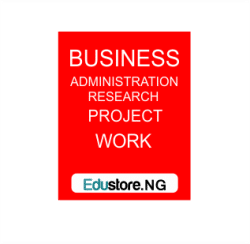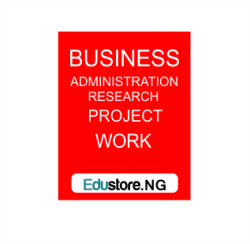THE IMPACT OF REWARD SYSTEM ON EMPLOYEES’ PRODUCTIVITY
(A STUDY OF NIGERIAN BOTTLING COMPANY LTD)
ABSTRACT
Reward Strategy is seen as one of the most important strategies in the human resource management function, as it influences the productivity or employees and growth of organization. Recently, numerous special journal issues have emerged on reward system, often focusing on organization differences. The aim of this study is to investigate and analyze the relationship between reward system and workers productivity. In this study, the researcher tried to link reward system with employee’s productivity. More specifically it aimed to find out which aspects of the reward system functions well, and which aspects could be further developed and improved in order to increase employee satisfaction. The data for this study were collected from the primary and secondary data. This primary source of data was obtained from the respondents through the use of questionnaires and personal interview. The secondary sources of data were obtained from textbooks journals, bulletins and internal materials. With inference from the implications of the findings, the research recommended that good and well designed reward strategy, in fact, play a major role in providing for an integrated and coherent range of human resource management processes which are mutually supportive and contribute as a whole to improving organizational effectiveness.
CHAPTER ONE
INTRODUCTION
1.1 BACKGROUND OF THE STUDY
In corporate organizations and companies nowadays, working conditions and reward system have been large, especially since World War II. The statement that working conditions and employee’s reward is the live wire of an organization is not an overstatement.
A well designed and functional reward system is an efficient way to increase employee work motivation. The appropriate type of reward is developed in accordance to the company’s reward philosophy, strategies and policy. However, it might be challenging to find the right way to combine the company’s integrated policies and practices together with the employee’s contribution, skill and competence. (Armstrong, 2006).
Reward system is an important tool that management can use to channel employee motivation in desired ways. In other words, reward systems seek to attract people to joint the organization to keep them coming to work, and motivate them to perform to high levels. The reward system consists of all organization components – including people processes rules and decision making activities involved in the allocation of reward and benefits to employees in organizations.
Organizational performance is a complex phenomenon largely affected by the ability and motivation of the workforce in any firm. Monetary and non-monetary rewards are provided in organizational setting with a view to motivating and influencing individuals, team and organizational behaviour for the achievement of strategic objectives and performance of organizations (Randhawa 2008).
In consideration of the era of global hyper competitiveness in the business world, rewards are fundamental imperatives to derive maximum employee inputs, retention, commitment from workers and industrial harmony between the workforce and manufacturing concerns.
However, a good number of firms do not provide appropriate mix of rewards to stimulate individual and sub-unit behaviour to attain strategic goals resulting in dwindling performance in the manufacturing sub-sector of the Nigerian economy.
Reward practices are positively related with retaining and enhancing the skilled employees that are considered assets of an organization. (Mondy and Noe, 1993) has divided reward in two types’ financial reward and non-financial reward. Financial reward is further divided into direct and indirect financial reward. Direct reward includes bounce, good salary packages, profits and commission indirect financial reward are all those benefits that are not covered by direct financial reward. Non-financial reward consists of responsibilities, opportunities, recognition promotion, vacations, work place environment, sound policies, insurance, medical, retirement etc. All these rewards affect the performances of the employees in different manners.
Reward system is an important tool that management can use to channel employee motivation in desired ways. In other words, reward systems seek to attract people to joint the organization to keep them coming to work, and motivate them to perform to high levels. The reward system consists of all organization components – including people processes rules and decision making activities involved in the allocate of compensation and benefits to employees in exchange for their contribution to the organization.
In order for an organization to meet its obligations to shareholders, employees and society, its top management must develop a relationship between the organization and employees that will fulfill the continually changing needs of both parties. At a minimum the organization expects employees to perform reliably the tasks assigned to them and at the standards set for them, and to follow the rules that have been established to govern the workplace. Management often expects more: that employees take initiative, supervise themselves, continue to learn new skills, and be responsive to business needs. At a minimum, employees expect their organization to provide fair pay, safe working conditions, and fair treatment. Like management, employees often expect more, depending on the strength of their needs for security, status, involvement, challenge, power, and responsibility. Just how ambitious the expectations of each party are, vary from organization to organization.
1.2 STATEMENT OF THE PROBLEM
Modern organizations are making very significant changes in their reward systems in order to better fit the dynamic, highly competitive business environment. Firms increasingly are using things such as skill-based pay, which rewards employees for the number and types of skills they possess instead of the type of job they have. Similarly, there is a strong movement to “at-risk” reward, where employee pay is tied to performance. Under this system, the employee’s bonus does not become part of his or her base pay. Instead, the bonus must be re-earned each year. These changes, and numerous others, are designed to help offset reward costs by gains in productivity, and to develop more flexible workforces. Reward costs have risen sharply in recent years, primarily because of escalating benefit costs. Employers now spend a huge amount of money on employee benefits.
Bacon et al (as cited by Uzair, 2011), emphasized that employees are key to maintaining competitive edge by a business. To be successful in global market, a firm needs highly motivated, skilled and satisfied workforce that can produce quality goods at low cost. According to Sarvadi (2010), firms that don’t match or exceed the reward levels of their competitors will have difficulty attracting and retaining top workers. Properly measuring performance ensures that a reward program pays off in terms of business goals since rewards have a real cost in terms of time and money.
An organization must contain these spiraling costs if it is to get a proper return on its human resource investment, and thus gain a competitive advantage. When reward-related costs escalate, the organization must find a way to offset them.
1.3 OBJECTIVES OF THE STUDY
1. To investigate the impact of reward system on employees’ productivity
2. To explore and determine the process of modern reward strategy in relation to employee’s productivity
3. To observe the significant relationship between reward system and employees’ productivity
4. Also, to present detailed principles and process of compensating workers to work effectively so as to increase employees’ productivity.
5. To examine how good reward can enhance individual employee and organizational growth.
1.4 RESEARCH QUESTIONS
1. Is there significant relationship between reward system and employees’ productivity?
2. Does effective reward system have positive impact on employees’ productivity?
3. Does reward lead to increased organizational performance?
4. Does reward have negative effects on organization’s total profit?
5. Does reward motivate workers to be more productive?
1.5 RESEARCH HYPOTHESIS
The following research hypotheses formulated will be empirically tested and result gotten will serve as a spring board for recommendations. The following are the hypothesis for the study:
Ho: There is no significant relationship between reward system and employees’ productivity
Hi: There is significant relationship between reward system and employees’ productivity
Ho: Effective reward system does not have positive impact on employees’ productivity
Hi: Effective reward system has positive impact on employees’ productivity
1.6 SIGNIFICANCE OF THE STUDY
At the end of this study, most organizations will understand that basic principles and process of rewarding workers to work effectively by highlighting the problem facing reward before and at present.
It will educate those who are studying Business Administration and management as a course in tertiary institution and organization and it will serve as reference for researchers.
1.7 SCOPE OF THE STUDY
The research is limited to the impact of reward on employees’ productivity; this is carried out within the context of large organization such as Nigerian Bottling Company Plc. This implies, the area in which data were collected for the study is limited to Nigerian Bottling Company, Benin city.
1.8 LIMITATIONS OF THE STUDY
One of the major problems encountered by the researcher is the monetary problem. There was no sufficient money to make the purchasing of all necessary materials for the research work. There was also the problem of meeting some personalities in Nigeria Bottling Company Plc to get information from them. Because of that, the researcher found it difficult to collect all the necessary information. However, the researcher made do with the resources available for her research work.
1.9 DEFINITION OF TERMS
Reward: Reward system consists of an organization’s integrated policies process and practices for rewarding its employees in accordance with their contribution skills competence and their market worth.
Productivity: Productivity is the output unit / per labour input into the production process given the level of existing technology.
Management: This is the process of planning, organizing, staffing, leading, directing, coordinating and controlling available resources toward s achieving a target objective.
Remuneration: This is the financial reward accruing to employee for his or her performance in the organization.
Motivation: It is the inner drives that arouse direct and maintain an individual behavior toward accomplishing organization goals.
Pay Structure: Is a framework for managing base pay progression over time for employee benefit.
Policy: Is organizational guiding principles that regulate its operation and activities.
Job Analysis: According to Raymond, etal (2004) it is the process of getting detailed information about jobs.
Job Description: Is the setting out of the purpose of job, where it is fit in the organization structure the content within which the job holder function and the principal accountability of job older. Main task the employee has to carry out.
Job Evaluation: Is a systematic process for establishing the relative work of job within an organization.
Reward Strategy: It is a definition of the intention of the organization on how its reward policies and process should be developed to meet business requirement.
1.10 HISTORICAL PROFILE OF THE ORGANIZATION UNDER STUDY
The Nigerian Bottling Company Ltd is one of the biggest companies in the non-alcoholic beverage industry in the country and is the sole franchise bottler of The Coca-Cola Company in Nigeria.
The company serves approximately 160 million people by producing and distributing a unique portfolio of quality brands, bringing passion to marketplace implementation, and demonstrating leadership in corporate social responsibility.
NBC Ltd started operations in Nigeria in 1951. Based in the city of Lagos, they operate 13 bottling plants across the country. In addition, they channel products through 59 warehouses and distribution centers.
The company employs about 4,800 people and indirectly supports the jobs of up to more than a million more in our value chain.
The company aims to be our customers’ most preferred supplier, and conduct programmes to support more than 450,000 customers who sell our products to consumers.
The company is part of the Coca-Cola Hellenic Group, one of the largest bottlers of the Coca-Cola Company’s products in the world, and the biggest in Europe. Coca-Cola Hellenic operations span 28 countries, serving more than 570 million people. The company is headquartered in Athens and listed on the Athens, New York, and London stock exchanges.
The company produces, sells and distributes a wide range of beverages, most of which are trademark products of the Coca-Cola Company. The company product’s portfolio consists of:
- leading brands Coca-Cola, Coca-Cola light, Fanta and Sprite
- local brands such as Schweppes, Five Alive, Limca and Eva
The company continuously reviews opportunities to expand our product portfolio in order to offer consumers in Nigeria an increasing range of choices. Every measure is taken to ensure that the company’s products are of the highest quality.
DOWNLOAD COMPLETE WORK- For Reference Only: Materials are for research, citation, and idea generation purposes and not for submission as your original final year project work.
- Avoid Plagiarism: Do not copy or submit this content as your own project. Doing so may result in academic consequences.
- Use as a Framework: This complete project research material should guide the development of your own final year project work.
- Academic Access: This platform is designed to reduce the stress of visiting school libraries by providing easy access to research materials.
- Institutional Support: Tertiary institutions encourage the review of previous academic works such as journals and theses.
- Open Education: The site is maintained through paid subscriptions to continue offering open access educational resources.






